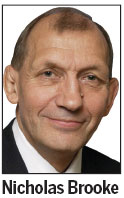To build a smart city calls for clever thinking from all sides
Updated: 2013-12-09 07:04
By Nicholas Brooke(HK Edition)
|
|||||||||
The notion of a smart city is certainly not new and the concept of the city as a complex system dates back to several decades. However, the motivation to create smart cities has only gained real momentum in recent years as associated technologies have become readily available, complementing the vision and motivation of governments and city planners. While the definition of a smart city can be rather ambiguous, central to its development is the effective use of information and communication technologies (ICT). Through ICT, resources can be more efficiently used, leading to cost and energy savings, a reduced environmental impact and better quality of life.
The importance of ICT has not been lost on the Hong Kong SAR Government. In 1998, as part of its efforts to develop a blueprint for ICT development in Hong Kong, the government released the Digital 21 Strategy. Fast forward to the present, the fourth Digital 21 Strategy is now being prepared, and will be issued in 2014 after the government completes its consultation with the public. From such feedback, and recommendations made by a government-commissioned consultant, a more progressive and evolving strategy is expected. This will take into consideration the latest technological developments, including wireless and multi-platform technologies, cloud computing and the Internet. Under the theme "Smarter Hong Kong, Smarter Living", the strategy will focus on four key areas, specifically, the public, which involves the provision of free digital ID, as well as Wi-Fi in schools to promote e-learning; the business community, by developing platforms for commercial and industrial use leading to greater R&D efforts; the ICT industry, by assisting companies to tap the mainland and overseas markets; and the public services, by means of developing an "intuitive, personalized multi-platform by default approach for e-services".

While the latest Digital 21 Strategy is certainly encouraging, and highlights the government's commitment to developing ICT as an industry in itself, in turn helping to transform Hong Kong into a smart city, the government might take into consideration the successes and setbacks of other cities around the world. During Smart City Expo World Congress 2013 held in Barcelona in late November, representatives from major metropolitan centers including Seoul and Rio de Janeiro - Rio winning the "Best Smart City 2013" title at the Expo - offered insights into smart city development. Among the key messages conveyed included the need to not only have the infrastructure in place, but also the ability to deliver the generated data to people from all walks of life so that they can gain personal benefits. Moreover, the aforementioned top-down approach where a centralized operation monitors the activities of the public is an approach that is only half-complete. A bottom-up methodology that reaches out to the public, drawing their feedback and direct input is equally important. The proliferation of smart technologies allows such engagement to be easily achieved while being a cost-effective alternative to infrastructure reforms.
The concept of engagement certainly resonates with Hong Kong Science and Technology Parks Corporation. Actively involved in bringing together the public and business sectors, it appreciates the importance of dialogue as well as public accountability. Given that the smart city industry will be worth an estimated $400 billion by 2020, the significance of such efforts cannot be emphasized enough.
Ultimately, the success of the ICT industry and Hong Kong's conversion into a smart city depend on the inputs of all citizens. The effective development and deployment of technologies from industry players; the pragmatic use of smart technologies by society; and the determination of the government to establish a clear direction so that human and financial capital are well invested, are all called for. Simply put, a smart city calls for smart thinking from all sides.
The author is chairman of the Hong Kong Science & Technology Parks Corporation.
(HK Edition 12/09/2013 page9)